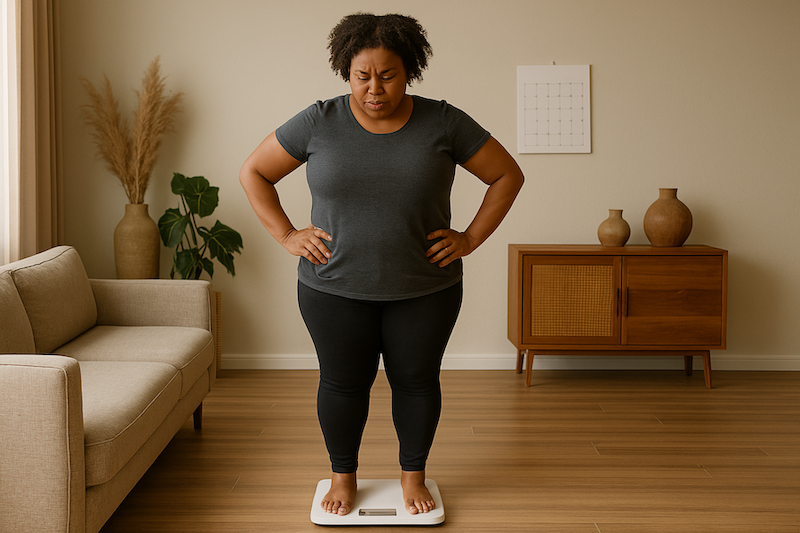How to Overcome Weight Regain After Gastric Sleeve
Struggling with weight regain after gastric sleeve? Learn why weight regain is so common after gastric sleeve and how to overcome it without surgery.

Bariendo Team
Team @ Bariendo
Weight regain after gastric sleeve can feel like a major setback. You worked hard, saw the results, but now the scale is creeping back up, and with it, a wave of frustration, confusion, or even shame.
But the truth is, you’re not alone. Weight regain after gastric sleeve is more common than most people realize. It doesn’t mean your sleeve failed, and it certainly doesn’t mean you failed. Over time, habits can slip. Grazing, eating larger portions, and emotional eating can slowly stretch the stomach and reduce that early feeling of fullness and satiety.
The good news is, you don’t need to start over, and you don’t need another surgery. In this article, we’ll break down why weight regain is so common after gastric sleeve and explore proven, non-surgical ways to get back on track. Whether you’ve regained a few pounds or more, there are tools and strategies that can help you feel confident in your progress again.
Can You Regain Weight After Gastric Sleeve?
The short answer is yes, you can regain weight after gastric sleeve surgery, and many patients do. While gastric sleeve is highly effective for initial weight loss, it’s not immune to long-term challenges and regrets.
Most patients lose weight quickly in the first 6 to 18 months after the surgery. This period is often called the “honeymoon phase” because restriction is at its strongest and hunger at its lowest. But after that, some weight regain is normal, especially as hunger hormones shift and lifestyle habits start to slip.
In fact, according to Dr. Pichamol Jirapinyo (co-founder at Bariendo) studies show that up to 75% of gastric sleeve patients experience weight regain within six years of their original surgery-a reminder that you’re far from alone in this experience.
The good news is, most patients who regain weight after gastric sleeve still maintain meaningful weight loss compared to their pre-surgery weight. The key is to catch the regain early and take the necessary steps to turn things around.
What Causes Weight Regain After Gastric Sleeve?
Weight regain after gastric sleeve is usually the result of a combination of anatomical, physiological, and behavioral factors. While the surgery is designed to reduce hunger and limit how much you can eat, the effects can diminish over time, especially if old eating habits return.
Stomach Stretching
Dr. Jirapinyo says, “Sleeve dilation over time can increase gastric capacity, leading to reduced satiety and increased caloric intake,.” After the surgery, the stomach is small and restrictive, but repeated overeating can cause it to stretch. Even a modest increase in the size of the sleeve can reduce the feeling of fullness and make it easier to eat more than your body needs.
Grazing and Mindless Eating
Grazing and mindless eating, or frequent snacking between meals, can be another major contributor. This habit is easy to fall into, especially when emotional eating or boredom come into play. Over time, it can quietly add hundreds of extra calories each day without you realizing it.
Hormonal Changes
After surgery, hunger hormones like ghrelin drop dramatically, but they may not stay low forever. Over time, ghrelin can increase again, making you feel hungrier. At the same time, leptin, the hormone that helps you feel full, can become less effective. This shift can lead to stronger cravings and a weaker sense of fullness, even if your portion sizes haven’t changed.
Behavioral Drift
In the early months after surgery, most people stick closely to post-op guidelines. But as time passes, portion sizes grow, protein intake drops, and healthy habits start to loosen. This gradual shift, sometimes called behavioral drift, can quietly undermine your progress.
Lack Of Follow-Up Support
Long-term success depends on ongoing support, including regular check-ins with your bariatric care team. Without ongoing guidance, small problems can go unnoticed and turn into larger setbacks.
Common Myths About Weight Regain After Gastric Sleeve
Regaining weight after gastric sleeve can come with a lot of self-doubt, and even more misinformation. Let’s clear up a few common myths.
First, regain doesn’t mean the surgery failed. Most patients still keep off a significant amount of weight long-term, even if they’ve gained some back. It also doesn’t mean your stomach has stretched back to its original size. While some expansion is common, the sleeve continues to limit how much you can eat, it just works best when paired with healthy habits.
Another common myth is that weight regain is a sign of weak willpower. In reality, obesity is a chronic health condition, not a personal failure. Gastric sleeve surgery is a highly effective treatment option, but it’s not a cure. And, factors like underlying health conditions, hormonal changes, and stress can all make it harder to maintain progress.
And, while so-called “pouch reset” diets are often promoted as a quick fix, there’s no evidence that they actually work. A structured reset can help you refocus on healthy eating patterns, but it won’t reverse stomach stretching. Non-surgical procedures like endoscopic Sleeve-In-Sleeve gastric sleeve revision or revision surgery are the only proven ways to physically reduce the size of the stomach again.
How to Lose Weight After Regain From Gastric Sleeve
Losing weight after regain isn’t about starting over. It’s about finding the right tools to get back on track. Let’s walk through some strategies that can help you lose weight after regain from gastric sleeve and set you up for long term success.
The SIS Procedure
Traditionally, the only option for addressing sleeve dilation, or “stretching,” was converting the sleeve to Roux-en-Y gastric bypass—a more invasive surgery with higher risk of complications. Today, safer, non-surgical options are available.
Dr. Jirapinyo explains that endoscopic Sleeve-in-Sleeve (SIS) revision offers a less invasive way to tighten the sleeve back to its original size. The procedure takes about 45 minutes, patients go home the same day, and studies show an average 15% total body weight loss—comparable to surgical results but with far less risk.
SIS gastric sleeve revision is a highly effective and appealing option for patients whose sleeve has stretched over time and want to avoid another surgery.
How GLP-1 Medications Can Help
For patients struggling with weight regain after gastric sleeve, GLP-1 medications like semaglutide may offer support. These medications mimic a natural gut hormone that helps reduce appetite, increase fullness, and slow stomach emptying—all of which make it easier to eat less without feeling deprived.
It’s important to note, though, that GLP-1 medications can’t reverse stomach stretching. If the size of the sleeve has increased, a structural intervention—like the SIS procedure—will be necessary to restore physical restriction. Medications can help address the behavioral and hormonal side of weight regain by making it easier to get back on track.
The Importance of Diet and Lifestyle
Even with surgery, the fundamentals still matter. Your eating habits and lifestyle play a key role in your ability to overcome regain and start losing weight again.
One of the most important steps is to return to the basics: prioritize lean protein, limit added sugars and processed carbs, and avoid snacking between meals. Measuring portions, planning meals, and eating slowly can help re-establish that sense of control you had early on.
Exercise is also crucial for maintaining a calorie deficit, boosting your metabolism, increasing energy, and improving your mood. Regular movement also helps your body build and maintain muscle, which supports long-term weight stability.
Mindset and Mental Health
Weight regain after gastric sleeve can take a toll on your confidence and motivation. Many patients feel ashamed, frustrated, or afraid to ask for help, especially if they believe they’ve “messed up” after surgery.
But the truth is, regain is common and the sooner you address it, the better the outcome will be. Focusing on small wins and gradual progress can help rebuild momentum. And when emotions are driving overeating, it’s a sign that deeper support may be needed.
Working with a therapist or joining a bariatric support group can help you identify triggers, build better cooping strategies, and reconnect with your long term goals.
Building Your Long-Term Success Plan
Weight regain after gastric sleeve isn’t unusual—and it’s not the end of the road. In fact, it’s something many patients experience. The key is recognizing what’s happening and addressing it quickly for the best outcome.
As Dr. Pichamol Jirapinyo explains, weight regain is often tied to a combination of anatomical and behavioral changes, and for some, sleeve dilation is the leading factor. While surgical revision has traditionally been the go-to option, endoscopic SIS revision offers a less invasive alternative with similar results and fewer risks.
If you’re noticing that you’re eating more than you used to and your weight is slowly creeping back, now is the time to take action. Reach out to the team at Bariendo to learn if the SIS procedure is right for you—and take the first step toward getting back on track.

